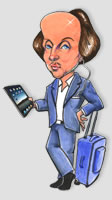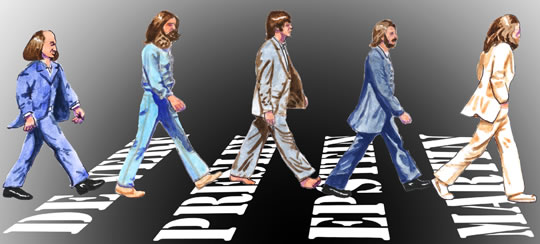The Authorship Question
Debate Over Who Wrote the Plays Leads
To One Conclusion: The Beatles Are Frauds!
With the upcoming release of the movie Anonymous, a political thriller based on the notion that Edward de Vere, Earl of Oxford in Elizabeth I's time, was the real author of Shakespeare's plays and poetry, it's fitting for me to weigh in on the authorship controversy.
And what I say is that The Beatles were frauds.
I've already reviewed James Shapiro's book Contested Will: Who Wrote Shakespeare? on this web site, but in this column, I'm approaching this issue from my own scholarship.
For the past 200 years, theories have circulated that Shakespeare of Stratford could not have written all those great works attributed to him, and the theory has become ubiquitous in our current conspiracy-mad age. Many alternative authors have been proposed, the most prominent being Francis Bacon (1561–1626), a philosopher and prolific writer in Shakespeare's time who had no qualms writing anything else under his own name; Oxford (1550–1604) who died before a third of Shakespeare's canon was probably written; and Shakespeare's fellow playwright Christopher Marlow, who was killed in 1593 but, his adherents claim, was secretly whisked away somewhere to continue writing under Shakespeare's name even though Shakespeare's name appears on plays written before Marlowe's death. Among the more far-fetched of the other authorship candidates is Queen Elizabeth.
Proponents of these individuals, respectively, the Baconians, Oxfordians, Marlovians, and Birthers, have published erudite theses supporting their contentions. However, rather than hard evidence, they offer mostly speculation, and much of their scholarship focuses on seeking clues in the plays and poems themselves. As is the nature of all conspiracy theorists, any hard evidence contrary to their views is considered misguided or even planted evidence and thus further support for their theories.
Because of that, my point here is not to contend with them on the basis of evidence; rather, I offer scholarship addressing their fundamental assumption, the foundation of all their theories, that some yahoo from Podunk-upon-Avon could not have had the breeding, education, or experience to write such stellar works of art (amazingly, one of the Baconians convinced that Shakespeare didn't have the necessary breeding, education, and experience was Mark Twain, the yahoo from Podunk-upon-Mississippi who didn't finish grade school).
If there is any artistic and cultural entity that tracks with Shakespeare in our own age, it would be The Beatles (hereafter, I'm referring specifically to the compositional core of The Beatles, Lennon-McCartney and George Harrison). Consider these parallels:
- Shakespeare had a middle-class upbringing in the provincial town of Stratford-upon-Avon. The Beatles had a middle-class upbringing in the provincial city of Liverpool. One prevalent anti-Shakespeare argument is that only a person of noble birth and access could have had the worldly experience evident in the plays, but I argue the contrary: History is a succession of examples where the elite—from Elizabethan nobles to the London establishment of 1960—are too insulated, and true cultural and political change is most often instigated by provincial, working-class, sponge-like minds.
- Sixteenth century Stratford was at the cultural crossroads of an ever-unifying England, and Shakespeare grew up in a county where the newly flourishing English language's three primary dialects merged. Twentieth century Liverpool was an international seaport, and The Beatles were exposed to the flourishing R&B and rock music coming from America and the Continent more so than the popular British standards broadcasting from London.
- Shakespeare was evidently an avid reader; so, too, were Lennon and McCartney.
- Shakespeare learned his craft by adapting existing stories and emulating other playwrights, even being accused of plagiarism. The Beatles honed their craft by arranging existing songs and emulating American R&B musicians, and later were accused of plagiarism.
- Shakespeare honed his writing skills by acting on the stage himself. The Beatles honed their compositional skills playing in the raucous clubs of Hamburg and Liverpool.
- There may not have been a Shakespearemania, but Shakespeare did quickly rise to the pinnacle of an art form/business and enjoyed an uncharacteristically long reign at the top, as did The Beatles.
- In the 33 years after his death, up until the Puritans closed the theater, The Bard's plays remained among the most produced, and his works were compiled in the Folio, a then-unprecedented greatest hits collection for a playwright. Forty years after their breakup, The Fab Four was the second-highest-selling musical act in the world (behind only Eminem), and their greatest hits compilation 1 was the best-selling album in the first decade of the 21st century and as of this writing is in the Billboard Top 100.
That last fact, illustrating how a fourth generation of fans has embraced The Beatles, is evidence that their music has the timeless quality to remain popular for the next 400 years.
And that is why, 200 years from now, scholars will start questioning how four Liverpool working stiffs without any formal music education could have composed and performed the greatest musical masterpieces of the English-speaking world. If the so-called Beatles didn't produce it, who did? Scholars will start looking for clues within the songs themselves, and in addition to discovering that Paul died sometime around 1966, they will stumble across many a eureka moment.
The first and most obvious candidate will be George Martin (1926–2016). He will have long been credited with recording the Beatles, but Martians will believe he went much further than that and actually was The Beatles. He was a true music man and had a number of compositions to his credit. Notice, too, that The Beatles didn't write any songs prior to Martin's “discovering” the band. This is blatantly not true, of course, because The Beatles were performing their own compositions long before Martin signed them, but that documented evidence does not suit the Martian case so it is either ignored or cited as Martin's true cleverness in covering up the conspiracy.
Brian Epstein (1934–1967) will later eclipse Martin as the man who really was The Beatles. Epstein was from the upper class, he was educated, and he was a music store owner, so he had all the exposure that a pack of street urchins couldn't have had. True, he died before half of The Beatles' catalog was recorded, but in fact it was all recorded before he died and references to the Vietnam War, Earth Day, and Yoko Ono were mixed in later. Epsteinians will find much of their evidence in the great autobiographical masterpiece Sgt. Pepper's Lonely Hearts Club Band, including “Lovely Rita,” which is actually Queen Elizabeth II, with whom Epstein had an affair that produced David Howell Evans, the true heir to the throne.
Others will look to other established musicians, especially noting those that most influenced The Beatles in their earliest recordings: thus comes the Elvians. Isn't it a bit ironic that Elvis Presley (1935–1977) went into the Army right about the time The Beatles were allegedly forming? Come on, Elvis in the Army? That is such an obvious ruse as to be laughable. Notice, too, that as The Beatles rose to fame, Elvis all but disappeared (again, ignoring a hunk of evidence to the contrary).
Someone, of course, will contend that Queen Elizabeth II was really The Beatles; anonymously crafting masterworks as a hobby must come with the name, I guess. If you have trouble getting your mind around the current queen writing “Why Don't We Do It in the Road” (and future conspiracists will contend that only she could have written it), just remember that some people actually believe Queen Elizabeth I wrote the deposition scene in Richard II only to have her own censors ban it.
Certainly, my theory that The Beatles will be seen some day as frauds seems at this moment totally ridiculous. We all grew up with The Beatles, we've listened to them, seen them, read about them, and we know how their career unfolded in the context of their particular times, which are our times, too. Imagine someone telling Ben Jonson in 1624 that people some day would claim that his friend and professional rival, William Shakespeare, didn't really write the plays attributed to him. Jonson being Jonson, this information would likely have prompted him to begin establishing clues suggesting he himself was the true author of Shakespeare's plays (memo to Mick Jagger: start now).
Is my foresight keener than any Baconian's or Oxfordian's hindsight? Dismiss my assertions as silliness if you will; just remember, it's all pure speculation.
Eric Minton
October 20, 2011
Comment: e-mail [email protected]
Start a discussion in the Bardroom



